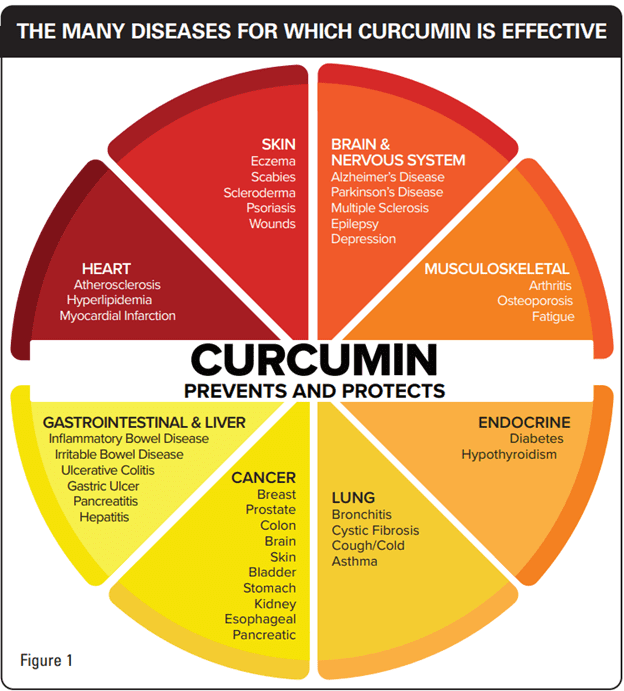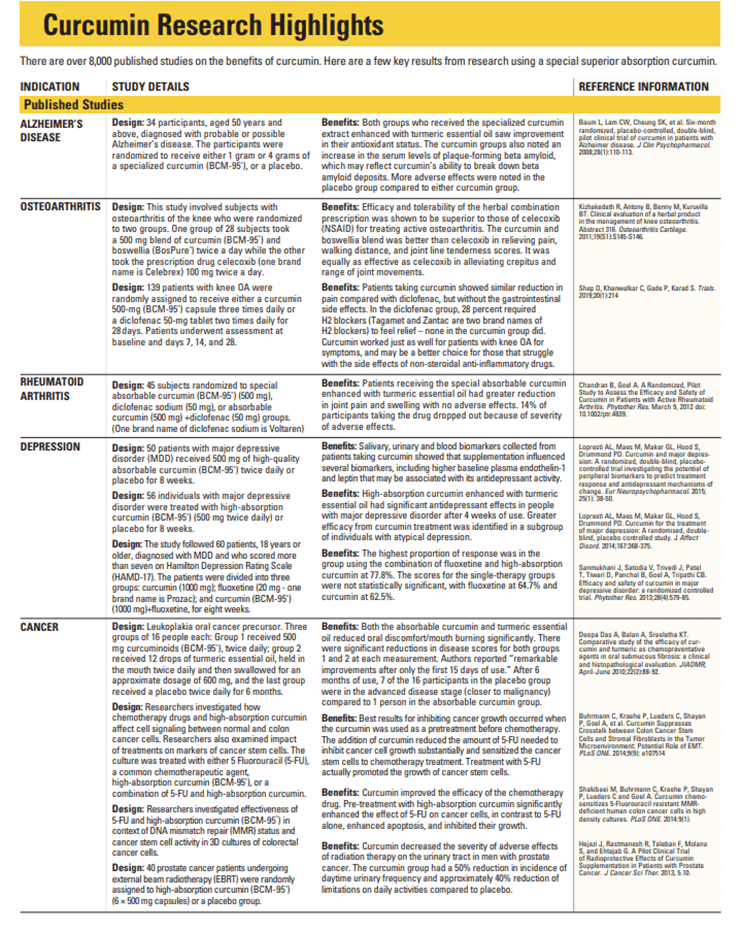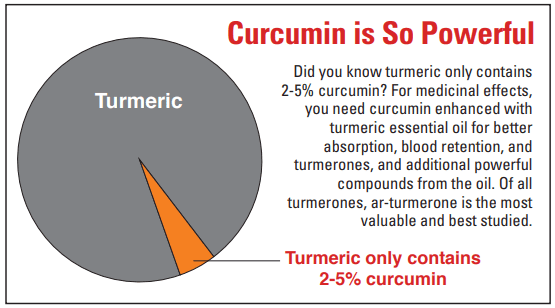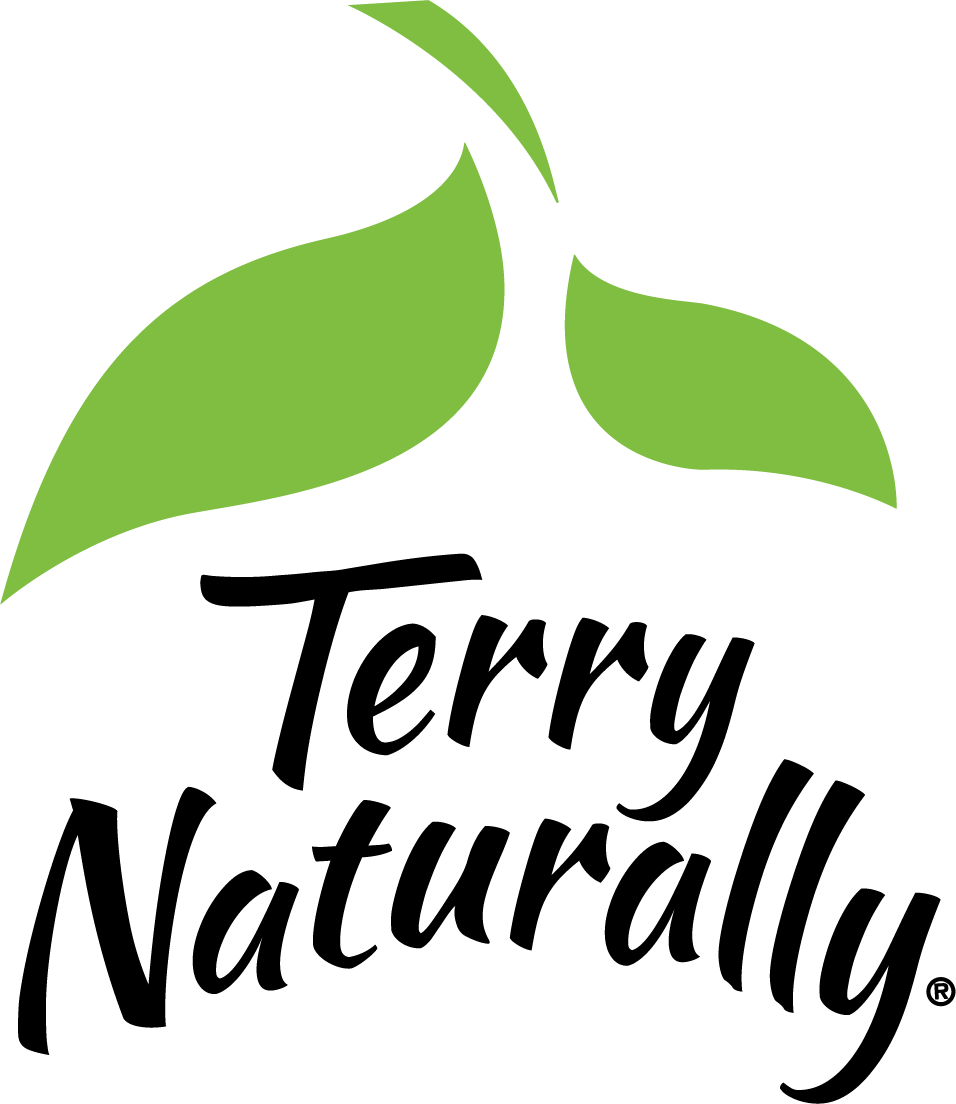Curcumin is the most potent component of turmeric, a plant that has been used in India as both a spice and a medicine for centuries. Besides adding a spicy kick to Indian curry, turmeric has been part of Ayurvedic medicine for millennia. But there is very little curcumin in turmeric. By extracting curcumin from turmeric, we have an even more powerful way to treat disease. Enhancing the absorption of curcumin by blending in turmeric essential oil has resulted in a natural substance that is as potent—or even more potent—at treating disease than prescription drugs, but without the adverse effects.
Why is Curcumin Good for So Many Problems?
One of the reasons that curcumin works so well on such a wide range of diseases is because it is such a powerful anti-inflammatory. We know that almost all chronic diseases—from diabetes to heart disease to arthritis to Alzheimer’s disease—have something in common: unchecked, destructive inflammation. Unlike synthetic drugs, which typically work against only a single inflammation pathway, natural curcumin reduces inflammation through its effects on multiple inflammation targets.

In technical terms, curcumin has been found to:
- Suppress activation of NF-kB, which regulates the expression of pro-inflammatory gene products
- Downregulate COX-2, the enzyme linked to most inflammation
- Inhibit 5-LOX, another pro-inflammatory enzyme
- Downregulate the expression of cell surface adhesion molecules linked to inflammation
- Inhibit the activity of TNF, one of the most pro-inflammatory cytokines (cell-signaling protein molecules)
Because of this anti-inflammatory activity, as well as its ability to kill tumor cells, increase activity of protective antioxidants such as glutathione, and modulate tumor growth cell factors, curcumin is effective against hundreds of diseases (See Figure 1).

Curcumin is also a potent antioxidant, able to neutralize unstable, reactive free radicals. Free radicals are molecules with a missing electron that stabilize themselves by “stealing” electrons from neighboring molecules, creating another free radical in the process. This chain reaction of free radical formation is known as a free radical cascade, and it can result in cellular damage (called oxidative stress) leading to inflammation and chronic disease—including cancer. Free radicals can negatively impact all body systems, including the immune system. Curcumin, like other antioxidants, is able to stop free radical cascades without becoming unstable itself. Its ability to neutralize free radicals is extraordinarily strong. In fact, curcumin has an antioxidant value of over 1,500,000 per 100 g. The dual properties of curcumin as both anti-inflammatory and super antioxidant contribute to its reputation as an extremely powerful, natural medicine.
Curcumin for Cancer
Our bodies have a natural ability to fight cancer through the activity of tumor suppressing genes. However, aging and environmental factors can turn off or silence these genes, allowing the cancer to grow and spread unchecked. Researchers have now found that one of the ways curcumin fights cancer is by re-awakening these “sleeping genes,” turning them back on to stop cancer. This branch of science is known as epigenetics, and it may hold the answer to treating many types of cancer.
Curcumin has been shown to stop cancer initiation, promotion, and progression, meaning that it stops the changes that cause normal cells to become cancerous, stops the replication of cancerous cells (tumor formation), and stops cancerous cells from migrating to other parts of the body (known as metastasis). Published studies on curcumin’s anticancer activity (so far) have found that it can suppress breast, prostate, liver, skin, oral, colon, and lung cancer. And as an adjunct to conventional treatment, recent cell research showed that the best results for inhibiting cancer growth occurred when curcumin was used as a pretreatment before chemotherapy.
Curcumin has also been shown to increase the activity of cancer drugs and to decrease drug resistance in cancer cells (meaning it helps cancer drugs kill tumors more efficiently). Additionally, it protects normal cells from the toxic effects of chemotherapy drugs and radiation treatments. Taking curcumin in combination with chemotherapy drugs may mean less of the toxic drugs are required, but the results will be better, with significantly reduced side effects. More human research is needed to better investigate this area of cancer care. In fact, a recent clinical trial showed that curcumin decreased the severity of adverse effects of radiation therapy on the urinary tract in men with prostate cancer.
While the research is still early, I believe this work is very exciting and shows how curcumin works against many types of cancers, because it works along many pathways—disrupting tumor growth along each of them.
Curcumin, Inflammation, and Chronic Disease
Inflammation is normal. It is a natural, physical response that is triggered when the body begins to repair damage or injuries. However, inflammation should be limited, with a definite beginning and end. It should not continue day after day. On-going, persistent inflammation is destructive, not restorative. One of the keys to improving chronic diseases (heart disease, diabetes, arthritis, asthma, etc.) is stopping the cycle of chronic inflammation. As discussed earlier, curcumin, unlike synthetic drugs, works on multiple inflammation pathways to help return the body to a normal inflammation balance. Additionally, curcumin has specific, unique mechanisms of action that make it invaluable in treating chronic diseases.
Heart Disease
In an experimental model of heart disease, curcumin was compared to the cholesterol-lowering drug lovastatin. The researchers found that curcumin protected against the effects of a high cholesterol diet just as effectively as lovastatin, preventing the inflammatory changes that lead to plaque buildup (and eventually, a heart attack), reducing triglycerides, and increasing protective HDL cholesterol levels. In fact, volunteers receiving 500 mg of curcumin daily in a small clinical trial experienced a 29% increase in HDL levels. Just a 1% increase in this “good” form of cholesterol can reduce your risk of heart disease by 2-3%, so this finding is very important. Curcumin has also been found to lower serum triglycerides by 27%. Triglycerides are an undesirable form of fat that circulates in the bloodstream. Although much attention has been focused on cholesterol levels in connection with risk of heart disease, new research is finding that reducing triglyceride levels is likely more important than controlling cholesterol levels. In fact, one recent scientific paper noted that high triglyceride levels nearly tripled the risk of a heart attack. Therefore, the ability of curcumin to reduce triglyceride levels is crucial in reducing your risk of heart disease.
Arthritis
The hallmarks of osteoarthritis are cartilage destruction and inflammation - two conditions that curcumin is able to prevent. An interesting property of curcumin is its ability to protect chondrocytes, specialized cells found in joint cartilage, from being broken down by inflammatory compounds (IL-1beta, MMP3) in the body. A recent clinical study looked at a combination of highly absorbable curcumin and boswellia (also an excellent, natural anti-inflammatory), or the prescription drug celecoxib (Celebrex) in the treatment of patients with arthritis. The herbal combination worked better than the drug, with no serious side effects! Remarkably, 93% of the participants receiving the herbal combination reported reduced or no pain, compared to only 86% of the prescription drug group. The group receiving the special curcumin and boswellia combination were also able to walk further, and had less pain and better range of movement, all without significant adverse effects. Prescription drugs such as celecoxib are classified as non-steroidal, anti-inflammatory drugs (NSAIDs), and are known to cause adverse effects such as stomach and intestinal bleeding ulcers, reduced kidney function, increased blood pressure, and increased risk of heart attack. Curcumin works just as effectively at reducing inflammation—without these potentially, life-threatening adverse effects.
In patients with rheumatoid arthritis (RA), the body’s own immune cells attack and destroy the lining of the joints (synovium). This chronic, painful, and debilitating condition is characterized by inflammation throughout the body, warm and swollen joints, and even joint destruction. Recently, researchers looked at the effects of 500 mg of a specialized, highly absorbable curcumin extract taken twice daily compared to 50 mg of the prescription drug diclofenac sodium (one brand name is Voltaren) twice daily, or a combination of the two in patients with RA. The group receiving the highly absorbable curcumin had the greatest reduction in joint pain and swelling, with no adverse effects. In contrast, 14% of the participants in the drug group stopped the test because of the adverse effects they experienced.
Another study compared this same curcumin to diclofenac for osteoarthritis. While diclofenac is widely used, it is well known to cause side effects, which can include stomach ulcers, acid reflux, GI bleeding, headaches, dizziness, and even kidney damage. This study found that curcumin provided just as much pain relief as the prescription drug, but with a much higher level of safety. In fact, 28 percent of the people taking diclofenac in this study had such severe gastrointestinal issues, they had to take a second drug to alleviate stomach pain and acidity caused by the first drug. No one taking curcumin needed this additional medication. In this study, the dosage of the curcumin – which is easy on the stomach – was 500 mg, taken three times daily, making it a simple regimen for anyone looking to relieve pain.
Diabetes
While diabetes is a disorder of blood sugar metabolism, inflammation plays a very strong role in its development and progression. Some researchers now believe that chronic, low-level inflammation, especially when associated with obesity, is actually the cause of insulin resistance leading to Type 2 diabetes. In an experimental model of diabetes, curcumin was compared to the drug rosiglitazone (Avandia®), and found to be equally as effective in reducing insulin resistance, inflammatory markers, and fats in the bloodstream. Other studies looking at the effects of curcumin in models of diabetes have found similar results: improved insulin response and reduced blood glucose levels. Additionally, scientific studies have found that curcumin may protect against other problems associated with diabetes, such as the breakdown of eye tissue, potential brain damage, nerve pain (neuropathy), and heart disease.
Alzheimer’s Disease
The cause of Alzheimer’s disease (AD) is not entirely known. However, certain characteristic changes are found in the brains of people with this condition – accumulated clusters of a protein called beta-amyloid, and clumps of dead and dying nerve and brain cells. These clusters and clumps, called plaques and tangles, are believed to interfere with the proper transmission of messages between brain cells and lead to the death of brain cells as well. Inflammation is also involved, causing the accumulation of plaques and tangles to have even more damaging effects. Because of the known anti-inflammatory effects of curcumin, researchers are now looking at its effects in treating AD.
What they have discovered is astonishing. Not only does curcumin protect brain cells from damaging inflammation, in experimental models of AD, curcumin was able to reduce beta-amyloid levels and shrink the size of accumulated plaques by over 30%! In fact, curcumin is more effective in inhibiting formation of beta-amyloid protein fragments than many other drugs being tested as Alzheimer’s treatments. One of the most prestigious Alzheimer’s research institutes in the world, the McCusker Alzheimer’s Research Foundation (supporting research at Edith Cowan University, Perth, Australia) is focused on learning more about the benefits of curcumin for treating AD.
Depression
Depression is a debilitating disease that is difficult to treat. Approximately 30% of patients who take prescription drugs to relieve their depression experience no benefits, and the remaining 70% will have only partial improvement. Additionally, the side effects can be significant, including nausea, weight gain, dizziness, dry mouth, blurred vision, insomnia and more. Because curcumin has been shown to be effective at treating other brain disorders, researchers theorize that it may also be helpful in relieving depression.
First, inflammation is known to play a major role in the development of depression. Therefore, it seems logical that the anti-inflammatory properties of curcumin may be helpful. Second, curcumin is also able to modulate the levels of brain neurotransmitters (chemical messengers – serotonin, norepinephrine, and dopamine) that influence mood, behavior, appetite, emotions and even dreaming and memory. In experimental models of depression, curcumin has been shown to increase levels of the “feel good” neurotransmitter, serotonin, as well as relieve other symptoms of depression. In a published study comparing a highly absorbable curcumin enhanced with turmeric essential oil to two prescription drugs, fluoxetine (Prozac) and imipramine (Tofranil), an experimental model found this highly absorbable curcumin to be just as effective as the two drugs – but without the adverse side effects.
In a clinical study, patients with major depressive disorder (MDD) showed the highest response using a combination of fluoxetine (Prozac) and high-absorption curcumin enhanced with turmeric essential oil – a 77.8% response rate as measured by the Hamilton Depression Rating Scale (HAMD-17).
Interestingly, the single-therapy groups scored almost exactly the same, with fluoxetine at 64.7% and curcumin at 62.5% – numbers so close that the difference is not statistically significant from one another.
Two important takeaways from this study: first, curcumin worked as well as the prescription drug fluoxetine in terms of the measurable changes in the HAMD-17 score from baseline to six weeks of treatment; second, curcumin can be an effective and safe treatment for patients with MDD without the terrible side effects of suicidal thoughts or other psychological disorders.
In a placebo-controlled study, high-absorption curcumin enhanced with turmeric essential oil showed antidepressant effects in people with major depressive disorder as early as four weeks after treatment. Additionally, people with atypical depression, a form that often does not respond well to antidepressant drugs, respond exceptionally well to curcumin. Research shows that curcumin influences biomarkers associated with depression and reduces their effects.
In an even more recent clinical study, curcumin at low and high dosages and a placebo were compared for their ability to relieve the symptoms of MDD. What was interesting about this study was that even at lower doses, people responded very well to curcumin. Both dosages effectively helped relieve symptoms of depression and accompanying anxiety for individuals in the test groups. In fact, 28 percent of participants showed a 50 percent or greater relief of symptoms. For those with atypical depression (a subtype of depression that can include intensive fatigue or weight gain), 65 percent experienced a reduction in symptoms by half or better.
Gastrointestinal Inflammation (IBD and IBS)
Chronic inflammation of the intestines (the gastrointestinal tract) is associated with several commonly experienced diseases – particularly irritable bowel syndrome (IBS), inflammatory bowel disease (IBD) and Crohn’s disease. Bloating, frequent diarrhea or constipation, gas, abdominal pain, even heartburn and acid reflux, can all be signs that unchecked, inflammation is affecting the proper function of your digestive system. A study of over 200 people with IBS found that use of a standardized extract of curcumin was associated with up to a 25% reduction in abdominal pain, and two-thirds of participants reported an improvement in overall symptoms. In a small pilot study of patients with Crohn’s disease or ulcerative proctitis (a type of IBD) who received curcumin along with the standard anti-inflammatory drugs (including steroids), many of the patients were able to reduce or stop the medications, and inflammation markers decreased to a normal level. One of the interesting benefits of curcumin is that it not only has been shown to reduce inflammatory compounds in the intestines, it can actually strengthen the intestinal wall to prevent harmful bacteria from passing out of the intestines and reaching other organs, such as the liver and kidneys.

Wound Healing and Skin Conditions
Curcumin not only protects skin with its ability to quench damaging free radicals and reduce inflammation, but it has also been shown to improve collagen deposition and vascular density in wounds. Collagen is the foundation upon which healthy skin is built; vascular density is what ensures adequate blood flow to carry in the nutrients needed for repair of damaged tissue. Many people who experience problems with slow healing of wounds also have diabetes. Diabetes interferes with wound healing because it causes reduced blood flow (nutrients needed for tissue repair are carried in the bloodstream). High blood sugar also interferes with the ability of the body to clear away damaged cells and build new skin cells. In an experimental model of diabetes, both oral and topical curcumin were able to speed wound repair and healing. Radiation treatment for cancer can also cause significant damage to the skin and delay healing. Pretreatment with oral curcumin has been shown in multiple studies to speed skin repair and healing. And finally, both oral and topical curcumin has shown promise at reducing inflammatory skin conditions such as psoriasis and eczema, as well as skin cancer.
Other Chronic Diseases
Curcumin has also shown promise in treating many other diseases and conditions, including obesity, kidney and liver disease, eye disorders, lung conditions, allergies, pancreatitis, and more. Curcumin may be able to protect against weight gain and body fat accumulation. In a study of animals fed a high fat diet, curcumin supplementation prevented the increase of adipose (fat) tissue as well as preventing fat deposits in the liver.

Curcumin Safety
No toxicity issues have been reported for curcumin, even when used in dosages as high as 10 grams or more daily. Because it is so safe and non-toxic, curcumin therapy is something to consider for almost any condition, especially conditions involving inflammation.
Curcumin Absorption and Utilization
While turmeric, the source of curcumin, has been traditionally recommended in India for thousands of years, it is important to remember that turmeric is prevalent in the Indian diet from childhood. That’s one of the reasons why India has lower rates of Alzheimer’s and other inflammation-related illnesses compared to individuals consuming a typical Western diet.
However, simply eating more curry and turmeric isn’t going to yield the kinds of clinical results discussed in this Terry Talks Nutrition. Instead, using a curcumin extract from turmeric that is then blended with turmeric essential oil containing beneficial turmerones—such as ar-turmerone— enhances the absorption of the compound and helps the body maintain higher blood levels much longer. Of all of the turmerones, ar-turmerone is considered one of the most valuable, and has been the subject of intensive research. In fact, when you compare the two on a gram-by-gram level, the clinically studied curcumin enhanced with turmeric essential oil delivers up to 500 times the curcumin to the bloodstream than turmeric. This specialized curcumin has been used in research studies at prestigious institutions, proving its positive effects on health as well as its enhanced absorption and utilization.
Powerful Natural Medicine
I hope this information has shown you why I think curcumin is the most powerful natural medicine available. No matter what your health concern might be, curcumin can help. Remember that when you shop for a curcumin product for yourself or your loved ones, look for an absorbable curcumin blended with turmeric essential oil to get the best benefits possible from this amazing natural medicine.
The information provided here is meant to be used in conjunction with the advice of a healthcare practitioner, who can help develop a treatment plan that is designed to address your unique health concerns for an optimal outcome.
